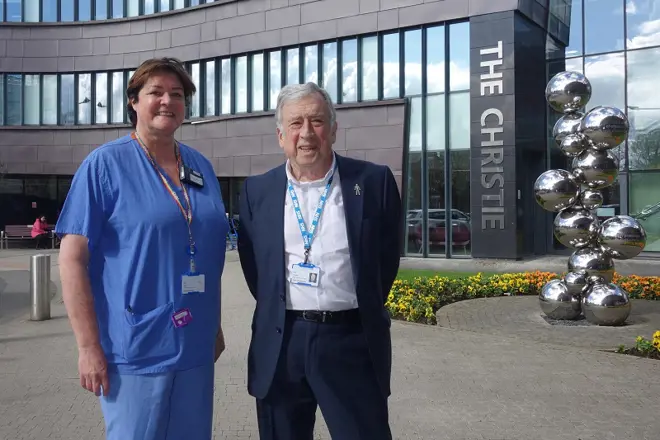
The Christie NHS Foundation Trust’s new governor has been reunited with the radiographer who helped successfully treat his prostate cancer 11 years ago.
Phil Ormesher is a 75-year-old semi-retired surveyor, and was recently elected governor of the Christie NHS Foundation Trust for the Cheshire area.
Mr. Ormesher wants to use his new platform to raise prostate cancer awareness. To help raise that awareness he has reunited with consultant radiographer Cathy Taylor, who helped diagnose him with, and treat him for, cancer in 2012 to do so.
'Friendly and caring'
He said: "It was lovely to meet Cathy again after so many years. During my treatment, she was very reassuring that everything possible was being done and was also very friendly and caring.
“I consider myself to be very fortunate. I hope that sharing my story encourages men to learn more about prostate cancer and to get a regular PSA [prostate-specific antigen] test. I also hope my experience demonstrates that prostate cancer doesn't have to be a killer if caught early enough.”
Upon diagnosis, Mr. Ormesher said he was “surprised” how little men in particular knew about prostate cancer, and he has made the condition his “specialist subject” to help spread awareness through public speaking events.
Raising awareness
Mr. Ormesher is a trustee and ambassador for the awareness charity Prostate Cancer Support and a lead champion for Answer Cancer, a Manchester-based cancer awareness campaign.
He added: “Very sadly, I have lost close friends to prostate cancer after it was diagnosed late and had already spread outside the prostate to other organs. One friend survived over 10 years following treatment, but another died at the age of 61, less than two years after diagnosis. Part of what drives me to raise awareness is that I don't want to lose any more friends or acquaintances to prostate cancer.
“Early diagnosis is the key, but early-stage prostate cancer can be asymptomatic, with four out of five men having no symptoms. That's why I am passionate about raising awareness and keen to encourage men to get the PSA test done regularly, ideally annually, as this is the only early detection test available.”
He emphasised the importance of annual testing to track PSA patterns, and see whether levels are increasing. One-off tests can be unreliable, as certain conditions can skew results.
More than 52,000 men are diagnosed with prostate cancer every year on average, or 144 men every day.
Treatment and recovery
Despite lacking symptoms at the time of diagnosis, a regular PSA blood test in 2012 indicated Mr. Ormesher was at increased risk of prostate cancer, prompting further investigation.
Mr. Ormesher’s examination found irregular lumps, and a biopsy found cancer aggressive enough to need treatment. An MRI scan showed the cancer was in its early stages, and was contained entirely within the prostate.
He was referred to The Christie for treatment in January 2013 and, in March 2013, went through an internal form of radiotherapy called brachytherapy, where radioactive seeds are surgically implanted in the prostate.
Then seven months later the treatment was deemed successful, and Mr. Ormesher made a good recovery with no side effects, his PSA levels back to normal.
“I did have a slightly awkward time at Athens airport, though, explaining how I had managed to set off their radioactivity alarms,” he added. “The knowledge that my cancer had been found early and that the treatment had a good chance of success helped me get through the experience."
First class
He added: “My impression of The Christie when I was going through treatment was that it was first class. The Christie is rather special. It's a centre of excellence for cancer treatment, and I feel incredibly fortunate that it is on my doorstep."
Following a close friend’s advice, Mr. Ormesher had been already been arranging annual PSA tests for several years before his diagnosis. Though his first tests were normal, the antigen levels slight increased each year – before shooting up by 50 per cent in 2012.
Mr. Ormesher said: “I'm hugely grateful that my friend Mike Lockett talked so openly about his cancer and encouraged me to have regular PSA tests. It meant I was able to act promptly and catch and treat the cancer early to maximise my chances of survival."
When he isn't raising cancer awareness in his spare time, he enjoys golf, classic cars and sportscars.
(Image: Cathy Taylor (L) and Phil Ormesher (R))
